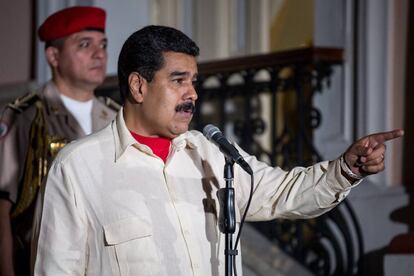Venezuela’s opposition stalls Maduro ‘trial’ after six dissidents released
Vatican-sponsored talks continue, but MUD says government must meet its demands soon
Venezuela’s opposition has temporarily suspended a planned symbolic trial of President Nicolás Maduro, as well as a protest march on the presidential palace in Caracas scheduled for Thursday, following the release of six political prisoners.

Julio Borges, the legislative leader of Venezuela’s MUD opposition roundtable, which controls the National Assembly, said on Tuesday that the Vatican had petitioned it to hold off the symbolic “criminal and political trial” inside the National Assembly “for a few days.”
The Vatican is overseeing talks that began on Sunday between Maduro’s government and the opposition.
MUD welcomed the release of the six political prisoners, named as Carlos Melo, filmmakers Andrés Moreno and Marcos Trejo, Coromoto Rodríguez, Pablo Parada and Jean Carlos Ortiz.
But the opposition insisted on five specific points that need to be met if the talks are to continue: the “unconditional” release of all political prisoners; for the National Assembly to recover its ability to set a budget, currently restricted by the Supreme Court; accepting international humanitarian aid to cover shortages of basic goods and medicines; and for a new National Election Commission (CNR) to be elected.
Dozens of people were arrested and wounded in demonstrations last week
The opposition also continues to demand a recall referendum on Maduro’s election in 2013, and for the next presidential election to be brought forward from 2018.
“We have put these points on the table, not so that they can be addressed in coming months but rather in the coming days and weeks,” said opposition legislative leader Julio Borges during Tuesday’s session, adding: “Otherwise, we will walk away from the negotiating table and continue with our struggle.”
Hundreds of thousands of people took to the streets last week in violent demonstrations that left dozens arrested and wounded.
Maduro’s opposition accuses him of creating a dictatorship by using institutions such as the CNE to block the recall referendum and sideline the National Assembly.
Even after losing power over Congress 10 months ago, Maduro has managed to stifle constitutional attempts at removing him through increased control over the electoral body, the Supreme Court, intelligence agencies and the military.
Since briefly removing former President Hugo Chávez from power in a coup in 2002, the opposition has taken its campaign against the self-styled socialist regime to the streets and garnering signatures from the electorate to hold a recall referendum.
MUD is insisting on five points being met to avoid further protests
But on October 20, Venezuela’s Supreme Court upheld a regional court’s decision postponing the next phase of a recall referendum, following allegations of fraud during the collection process in four states.
The move could mean the MUD will have to restart the entire process in the four states where the fraud allegations surfaced. Such an outcome would be a major setback. The CNE announced last month that the plebiscite could be held no sooner than April of 2017.
The ultimate timing of the referendum is critical for the opposition.
If Maduro loses a vote before January 10, snap elections will be held, and his ruling socialists would face the prospect of losing the presidential office for the first time in 14 years. The last time the right wing took power was during the aforementioned coup in 2002.
However, if the referendum takes place after January 10, Maduro will simply be replaced by his vice-president until the scheduled elections are held in 2018.
English version by Nick Lyne.
Tu suscripción se está usando en otro dispositivo
¿Quieres añadir otro usuario a tu suscripción?
Si continúas leyendo en este dispositivo, no se podrá leer en el otro.
FlechaTu suscripción se está usando en otro dispositivo y solo puedes acceder a EL PAÍS desde un dispositivo a la vez.
Si quieres compartir tu cuenta, cambia tu suscripción a la modalidad Premium, así podrás añadir otro usuario. Cada uno accederá con su propia cuenta de email, lo que os permitirá personalizar vuestra experiencia en EL PAÍS.
¿Tienes una suscripción de empresa? Accede aquí para contratar más cuentas.
En el caso de no saber quién está usando tu cuenta, te recomendamos cambiar tu contraseña aquí.
Si decides continuar compartiendo tu cuenta, este mensaje se mostrará en tu dispositivo y en el de la otra persona que está usando tu cuenta de forma indefinida, afectando a tu experiencia de lectura. Puedes consultar aquí los términos y condiciones de la suscripción digital.








































